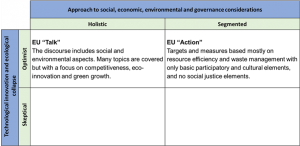The EU has embraced the concept of the circular economy (CE) since the publication of the European Union’s Circular Economy Action Plan in 2015. It is now a central component of many EU policies including the European Green Deal and the Coronavirus Recovery Plan. However, academic research has yet to evaluate the discourse and policies of the EU on the CE. This is precisely what Martin Calisto Friant (Utrecht University), Walter Vermeulen (Utrecht University) and Roberta Salomone (University of Messina) have examined in their latest paper, published in the Journal Sustainable Production and Consumption and openly accessible here.
Their research uses a typology of circularity discourses as a theoretical framework to uncover the EU’s vision of the CE. This typology is particularly well suited for this analysis as it was built through an in-depth research of CE and CE-related concepts through history and conceptually distinguishes different circularity visions based on their position on core socio-ecological questions.
Using this typology, the paper reviews the 25 communications, regulations and directives on the CE, which were adopted by the Junker Commission (2014-1019), through a mixed methods approach that includes qualitative and quantitative analysis.
Research results demonstrate that the EU’s policies on the CE, follow a technocentric approach, which focuses on technical product regulations and recycling targets. The EU’s discourse, on the other hand, is much more inclusive and mentions many socio-political elements of a circular transition such as human health, equity, participation and inclusiveness. The paper thus finds a dichotomy between words and actions, with a discourse that is rather holistic while policies focus on technical “end of pipe” solutions (see figure 1).

Figure 1. EU circularity discourse (talk) and policy (action)
Moreover, the research finds that both EU policies and discourses follow an eco-modernist approach, which clearly aims for the decoupling of economic growth from environmental exploitation. This emphasis on “green growth” is problematic from an academic point of view as research has found that an absolute sustained decoupling of economic growth from environmental harm is impossible (Haberl et al., 2020; Ward et al., 2016). In fact, EU citizens currently have an ecological footprint which is over 5 times higher than what scientists have generally recognized as sustainable (Hickel, 2020; Hickel & Kallis, 2019; Mont, Neuvonen, & Lähteenoja, 2014; Rijnhout, Stoczkiewicz, & Bolger, 2018). The scale of the reduction in ecological footprint needed for Europeans to live within the biophysical limits of the earth is so vast that it is impossible to achieve, while also growing GDP per capita (Albert, 2020; Haberl et al., 2020; Hickel & Kallis, 2019; Parrique et al., 2019). This seriously question’s the EU’s insistence on the CE as an avenue for economy “green growth”.
To address the abovementioned limitations, the paper proposes a set of 32 science-based policy recommendations which can help strengthen CE policies both within and outside the EU. This research thus brings key insights for practitioners and academics seeking to better understand the EU’s CE policies and how to improve CE implementation at both national and international level. To find out more about their findings please see the full open access article: https://doi.org/10.1016/j.spc.2020.11.001
References:
Albert, M. J. (2020). The Dangers of Decoupling: Earth System Crisis and the ‘Fourth Industrial Revolution.’ Global Policy, 11(2), 245–254. https://doi.org/10.1111/1758-5899.12791
Haberl, H., Wiedenhofer, D., Virág, D., Kalt, G., Plank, B., Brockway, P., … Creutzig, F. (2020). A systematic review of the evidence on decoupling of GDP, resource use and GHG emissions, part II: Synthesizing the insights. Environmental Research Letters, 15(6). https://doi.org/10.1088/1748-9326/ab842a
Hickel, J. (2020). The sustainable development index: Measuring the ecological efficiency of human development in the anthropocene. Ecological Economics, 167. https://doi.org/10.1016/j.ecolecon.2019.05.011
Hickel, J., & Kallis, G. (2019). Is Green Growth Possible? New Political Economy, 0(0), 1–18. https://doi.org/10.1080/13563467.2019.1598964
Mont, O., Neuvonen, A., & Lähteenoja, S. (2014). Sustainable lifestyles 2050: Stakeholder visions, emerging practices and future research. Journal of Cleaner Production, 63, 24–32. https://doi.org/10.1016/j.jclepro.2013.09.007
Parrique, T., Barth, J., Briens, F., Kerschner, C., Kraus-Polk, A., Kuokkanen, A., & Spangenberg, J. . (2019). Decoupling debunked: Evidence and arguments against green growth as a sole strategy for sustainability. Brussels.
Rijnhout, L., Stoczkiewicz, M., & Bolger, M. (2018). Necessities for a Resource Efficient Europe. In H. Lehmann (Ed.), Factor X Challenges, Implementation Strategies and Examples for a Sustainable Use of Natural Resources (pp. 13–30). Springer, Cham. https://doi.org/10.1007/978-3-319-50079-9_2
Ward, J. D., Sutton, P. C., Werner, A. D., Costanza, R., Mohr, S. H., & Simmons, C. T. (2016). Is decoupling GDP growth from environmental impact possible? PLoS ONE, 11(10), 1–14. https://doi.org/10.1371/journal.pone.0164733

